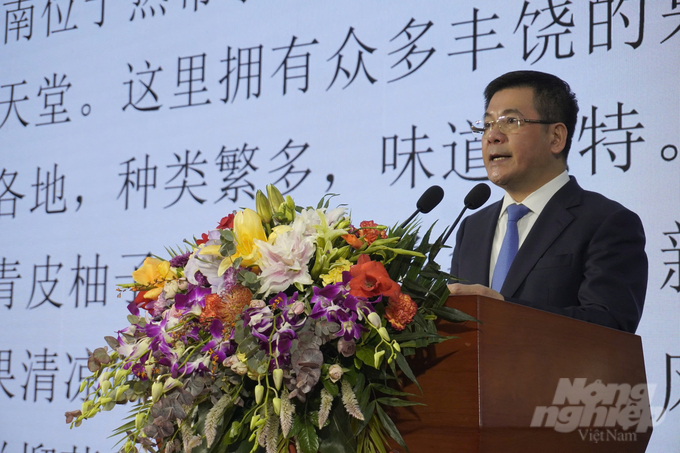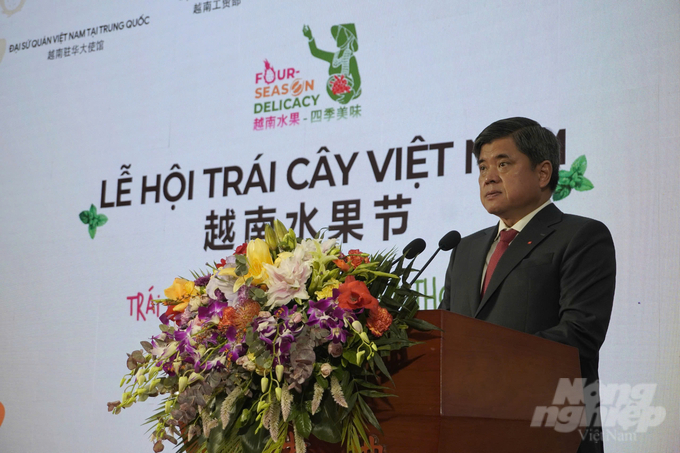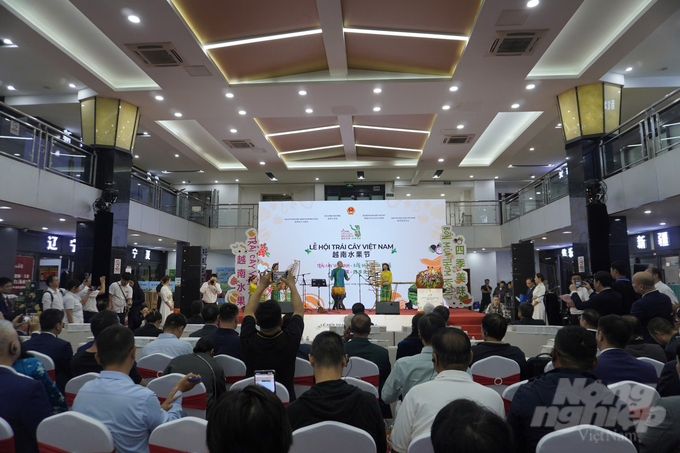May 20, 2025 | 09:48 GMT +7
May 20, 2025 | 09:48 GMT +7
Hotline: 0913.378.918
May 20, 2025 | 09:48 GMT +7
Hotline: 0913.378.918

Vietnam's Minister of Industry and Trade, Nguyen Hong Dien, delivered the opening speech at the First Vietnam Fruit Festival.
The inaugural Vietnamese Fruit Festival, which will be held in Beijing, China on September 29, is inaugurated under the theme "Vietnamese Fruit – Four-season Delicacy."
The Ministry of Agriculture and Rural Development and the Ministry of Industry and Trade are collaborating to organize the Vietnamese Fruit Festival in Beijing, China, from September 29 to 30.
During the launching ceremony, Vietnamese Minister of Industry and Trade Nguyen Hong Dien disclosed that Vietnam is situated in a tropical, monsoon climate region, which is regarded as a paradise for tropical fruits. Specifically, there are numerous fruit gardens throughout the nation that offer a wide range of flavors and varieties.
Vietnam's fruit products generate revenues of up to USD 3.5 billion annually, supporting exports and meeting domestic demand with an annual production of 12 to 14 million tons.
The comprehensive strategic cooperative partnership between Vietnam and China has been thriving in recent years, resulting in practical advantages for both parties. Despite the global economic downturn, the two countries have accomplished numerous significant and positive results as a result of the significant deepening of economic and trade cooperation.
China has consistently been Vietnam's largest trading partner, and Vietnam has become China's largest trading partner in ASEAN and the fifth-largest globally. This serves as evidence of this. Vietnam is the third-largest associate of China in the global supply of fruits and fruit products. Chinese consumers favor numerous products that have established a stronghold.
Minister Nguyen Hong Dien contends that the outcomes, however, reached thus far have not yet been matched the potential, requirements, and capabilities of both parties.
The primary export of Vietnam's fruits to China is through cross-border trade, in order to satisfy the needs of specific local markets in the southern and southeastern regions of China, as well as provinces in close proximity to Vietnam. The demand for fruits in the Chinese market is substantial, and Vietnam has a significant potential to supply high-quality specialty fruits.

Vietnam's Deputy Minister of Agriculture and Rural Development, Tran Thanh Nam, stated that bringing Vietnamese fruits to the Chinese market allows consumers to enjoy the wonderful flavors of various fruits as if they were in Vietnam.
In fact, the presence of Vietnamese fruit products in other regions is relatively low. Therefor, there is still a significant amount of potential for fruit enterprises in both countries to further investigate and capitalize on.
The MoIT and MARD of Vietnam organized the event with the objective of executing and realizing the political determination and commitments of the two leaders following General Secretary and President To Lam's visit to China in August.
The festival continues to attract numerous major Vietnamese enterprises that specialize in the export of fresh and processed fruit to China.
"This is an excellent opportunity for Vietnamese producers and suppliers to introduce and promote their top-tier fruit brands and products, as well as to establish and pursue relationships with customers, fortify trade activities, and establish sustainable cooperative relationships with potential fruit importation partners in China. This initiative offers Chinese consumers an opportunity to directly experience the distinctive and distinctive quality and flavor of Vietnamese fruits, thereby promoting the national brand of Vietnamese agricultural products, particularly fruits, in the Chinese market", Minister Nguyen Hong Dien underscored.
Vietnam and China are neighboring countries with a long-standing tradition of friendship and close ties, as Deputy Minister of MARD Tran Thanh Nam affirmed. The geographical proximity, similar soil and climate conditions, and cultural echoes in cuisine serve as a foundation for the promotion of trade between the two countries, with a particular emphasis on the exchange of specialty fruits. The introduction of Vietnamese fruits to the Chinese market enables consumers to experience the delightful flavors of a variety of fruits as if they were in Vietnam.
The Vietnamese Ministry of Agriculture and Rural Development and the Ministry of Industry and Trade have collaborated in the planning of cultivation areas, the tranperancy of the cultivation process, the strict management of production unit codes, processing facilities, and the origin traceability system. As a result, 12 types of Vietnamese fruits have been exported to the Chinese market, with an estimated trade value of approximately USD 4.5 billion in 2024. The General Administration of Customs of China and relevant agencies have provided significant support in this trade result.

Overview of the festival inauguration.
According to Deputy Minister Tran Thanh Nam, Vietnam's tropical climate, which covers 15 latitudes, provides the optimal conditions for the cultivation of a diverse array of fruits with distinctive flavors. Among others, dragon fruit has an annual production of 1.3 million tons, mango has 1.1 million tons, durian has 1.2 million tons, banana has 2.5 million tons, pomelo has 1.1 million tons, jackfruit has 980,000 tons, lychee has 320,000 tons, longan has 635,000 tons, pineapple has 725,000 tons, and rambutan has 320,000 tons.
Located in regions with officially designated cultivation codes, these fruits satisfy both national and international quality standards for export. At present, Vietnam has 5,840 cultivation areas with assigned codes for fruit export, of which 40.2% (2,350 areas) are designated for the Chinese market.
"Vietnamese fruits are not only a wonderful gift from nature but also serve as ambassadors of Vietnamese agriculture, reflecting the rich culture of the Vietnamese people," emphasized Deputy Minister Tran Thanh Nam.

The First Vietnam Fruit Festival took place from September 29 to 30 at the Xinfadi Agricultural Product Distribution Center, Fentai District, Beijing, China.
To further promote agricultural trade between the two countries in the near future, Deputy Minister Tran Thanh Nam hopes that through this festival, relevant agencies from both nations will continue to strengthen cooperation in removing barriers and opening markets for agricultural products. Specifically, he called on agencies within the General Administration of Customs of China to expand the range of Vietnamese agricultural, forestry, and aquatic products, especially specialty fruits, introduced and consumed in the Chinese market.
He also urged associations, businesses, and investors from both countries to enhance collaboration and partnerships to expand the market, develop sustainable agricultural value chains for export, and invest in sectors that support exports such as trade promotion, logistics, wholesale markets, cold storage chains, preservation, processing, and seed selection.
The trade and agricultural agencies of both countries are encouraged to work more closely with localities, associations, and businesses to continue organizing agricultural trade festivals in other potential regions of China in the future.
The First Vietnam Fruit Festival was held at the Xinfadi Agricultural Product Distribution Center in Fentai District, Beijing. Xinfadi supplies 90% of agricultural products to the residents of the Chinese capital.
Translated by Linh Linh

(VAN) On May 15, Ministry of Agriculture and Environment of Vietnam hosted the 'Connecting Vietnam - Germany agricultural, forestry and fishery trade' seminar in Berlin, Germany.

(VAN) In the face of counterfeit and imitation products, Khanh Hoa Salanganes Nest Company hopes for the prompt completion of the legal framework, strict enforcement against violations, and protection of the bird’s nest brand.

(VAN) Japan's efforts to lower the price of rice through the release of its stockpile may finally be making some progress, albeit at a snail's pace.

(VAN) U.S. tariffs are not only a 'shock', but also an opportunity for Vietnamese businesses to renew their mindset toward comprehensive development.

(VAN) As Bac Giang lychee enters the harvest season, Minister Do Duc Duy expects that the fruit will contribute greatly to agricultural exports due to standardized production and deep processing.

(VAN) Consumers have shown a preference for free-range eggs, but those farming systems are more vulnerable to biosecurity risks like bird flu.
/2025/05/09/5701-1-184335_301.jpg)
(VAN) Vietnam’s eel exports nearly doubled thanks to a mud-free farming model, opening up new prospects while still facing numerous barriers related to international standards.